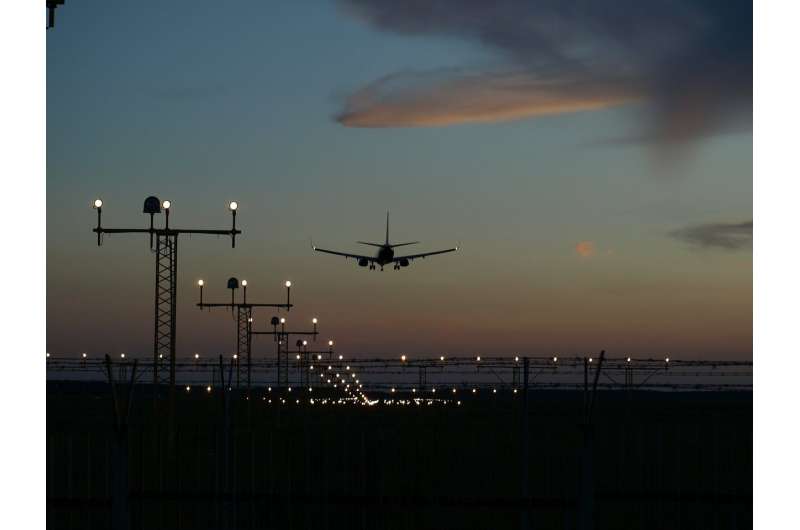

On the same day last week that Air New Zealand announced the purchase of its first fully electric aircraft, Christchurch Airport announced it had reached “a new standard for decarbonization”. On the face of it, great news for reducing aviation emissions in Aotearoa.
The reality is a little more complex—and risky. As the climate warms, so too is the temperature in boardrooms and courtrooms. The aviation industry is under increasing scrutiny for its sustainability claims, and climate litigation is on the rise.
At the same time, “net zero” strategies in general are being challenged. The United Nations High-Level Expert Group was established at last year’s COP27 summit, as Secretary General António Guterres explained, because “net zero suffers from a surplus of confusion and a deficit of credibility”.
The expert group has put forward a set of net-zero guidelines to put a “red line through greenwashing”. The guidelines underpin the UN’s approach to net zero, which requires corporate entities to advance ambitious climate mitigation actions based on rigorous and comprehensive science-based targets.
Among other things, the targets must include emissions reductions from the entity’s full value chain and activities. These include emissions from sources the entity owns and controls directly (known as scope 1); emissions the entity causes indirectly (scope 2); and emissions not produced by the entity itself, but arising up and down its value chain (scope 3).
The expert group also notes that voluntary carbon credits (offsets) cannot be counted towards interim emissions reductions required on the pathway to Net Zero 2050. This is because carbon offsetting has been shown to be troublesome at best, and in many cases a scam.
Airlines in the firing line
Key players in the global aviation industry that make unsupportable claims have become targets for climate litigation.
A recent greenwashing complaint to the European Commission, for example, was filed by consumer groups in 19 countries against 17 airlines. Virgin Atlantic and British Airways are facing formal complaints filed by a climate charity and law firm over sustainable flight claims.
Advertisements for Air France, Lufthansa and Etihad have been banned in the UK for greenwashing, following complaints to the UK Advertising Standards Board that phrases such as “protecting the future”, “sustainable avitaion” and “low-emissions airline” are misleading consumers.
Delta faces a class action lawsuit for claiming to be “the first carbon neutral airline on a global basis” in a case brought by a California resident claiming the airline has grossly misrepresented its climate impact.
And KLM is being sued for greenwashing by law firm Client Earth, which successfully argued the Dutch airline’s “Fly Responsibly” campaign consitutes misleading advertising under EU law while KLM is growing its number of flights rather than reducing emissions.
Long-haul growth versus decarbonization
Cases like these raise questions about Air New Zealand’s “Flight NZ0” strategy and marketing, which focuses on sustainable aviation fuel and next-generation aircraft (including its recently bought electric Beta Alia), complemented by carbon offsetting and operational efficiency.
The focus on sustainable fuel will have to overcome significant scientific, energy, scalability and cost barriers. Solutions to these complex problems are likely to be decades away at least.
While Air New Zealand promotes the Beta Alia—with its inherent altitude, payload and range limitations—it also aims to significantly increase its long haul network, and is setting its sights on the “ultra long haul experience”.
The contradiction between long-haul growth and decarbonization strategies is expressed in the airline’s own 2017 sustainability report, in which the sustainability advisory panel chair wrote:
“And that’s the dilemma for anyone who cares passionately about addressing the multiple threats of climate change: either stop flying altogether (the logical but somewhat unworldly idealist’s position), or fly as little and as discriminatingly and responsibly as possible (the often uncomfortable pragmatist’s position).”
As consumers and environmentalists focus more on the validity of climate claims and the viability of carbon reduction strategies, Air New Zealand may find it harder to defend its net zero pathway.
Airports on the radar
The environmental claims of other players in the wider aviation system—notably airports—are also likely to attract critical attention.
Airports Council International (ACI) is the global industry body for airports, with over 550 airports taking part in its Airport Carbon Accreditation program, including many in New Zealand (most recently Invercargill Airport).
Christchurch Airport has been in the program for longer, and makes significant climate claims. In April 2022, it announced “another world class sustainability achievement”, going “beyond carbon neutral, to become climate positive”.
But this doesn’t account for scope 3 emissions, mainly associated with flights in and out of the airport, which make up 95.39% of total emissions. Airports can only appear to be climate-neutral by not accounting for the high and growing emissions of the planes that are their core business.
Stakeholder reputations on the line
Key stakeholders are also exposed to any potential accusations of greenwashing. Christchurch City Council own 75% of the airport through a holding company, and the government owns 25%. Both have declared climate emergencies and made emissions reduction commitments.
Industry groups are involved, too. Tourism Industry Aotearoa, which represents businesses across the tourism industry, last month announced Christchurch Airport the winner of its Tourism Environment Award.
It cited the airport’s “climate positive” status and hailed it as being “at the forefront of airport environmental initiatives globally”. Such claims can be technically true if one accepts the limited parameters used to measure them.
But the Tourism Industry Aotearoa will need to ensure its environmental awards keep pace with developments in this rapidly changing field—including the increasing risk of litigation over unsustainable claims about sustainability.
Provided by
The Conversation
This article is republished from The Conversation under a Creative Commons license. Read the original article.![]()
Citation:
The NZ aviation industry is making bold climate claims—and risking anti-greenwashing litigation (2023, December 13)
retrieved 13 December 2023
from https://phys.org/news/2023-12-nz-aviation-industry-bold-climate.html
This document is subject to copyright. Apart from any fair dealing for the purpose of private study or research, no
part may be reproduced without the written permission. The content is provided for information purposes only.





